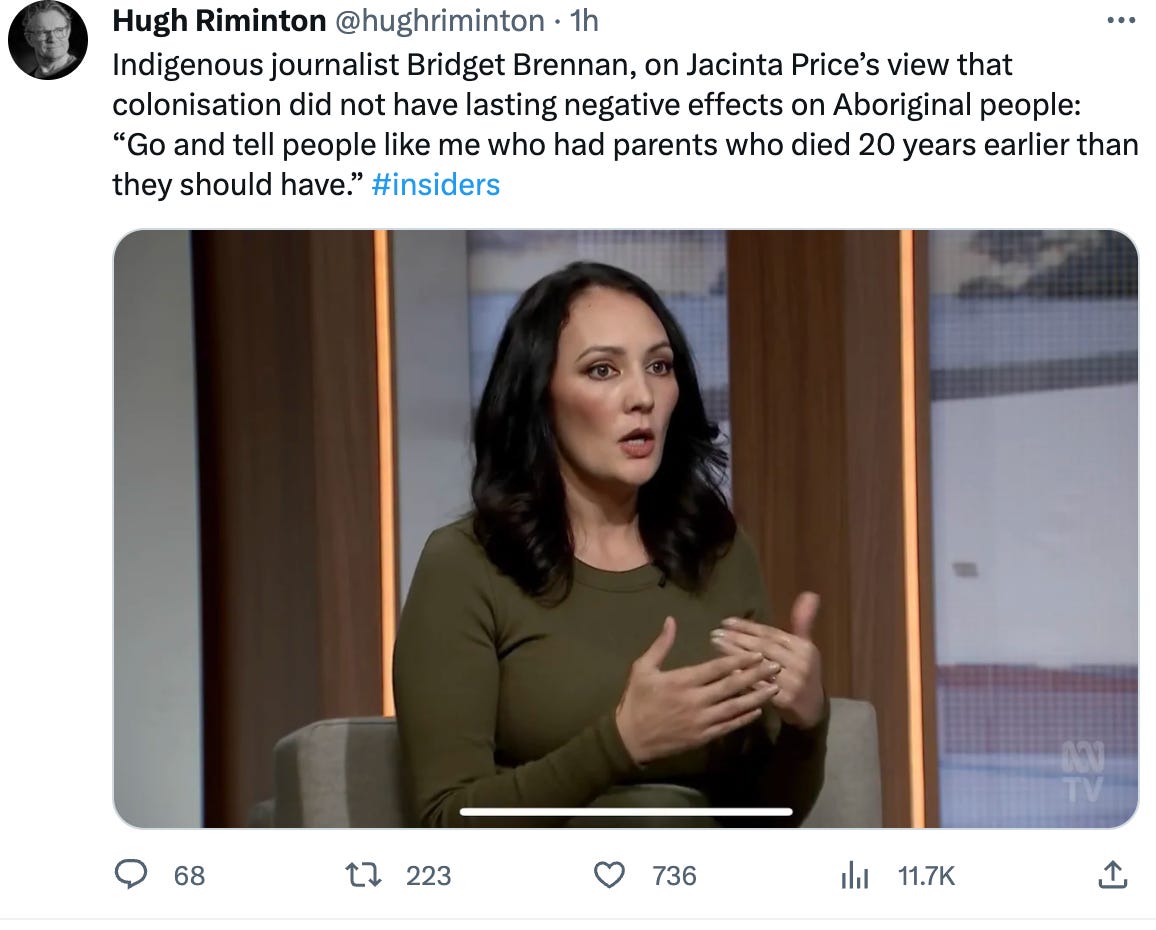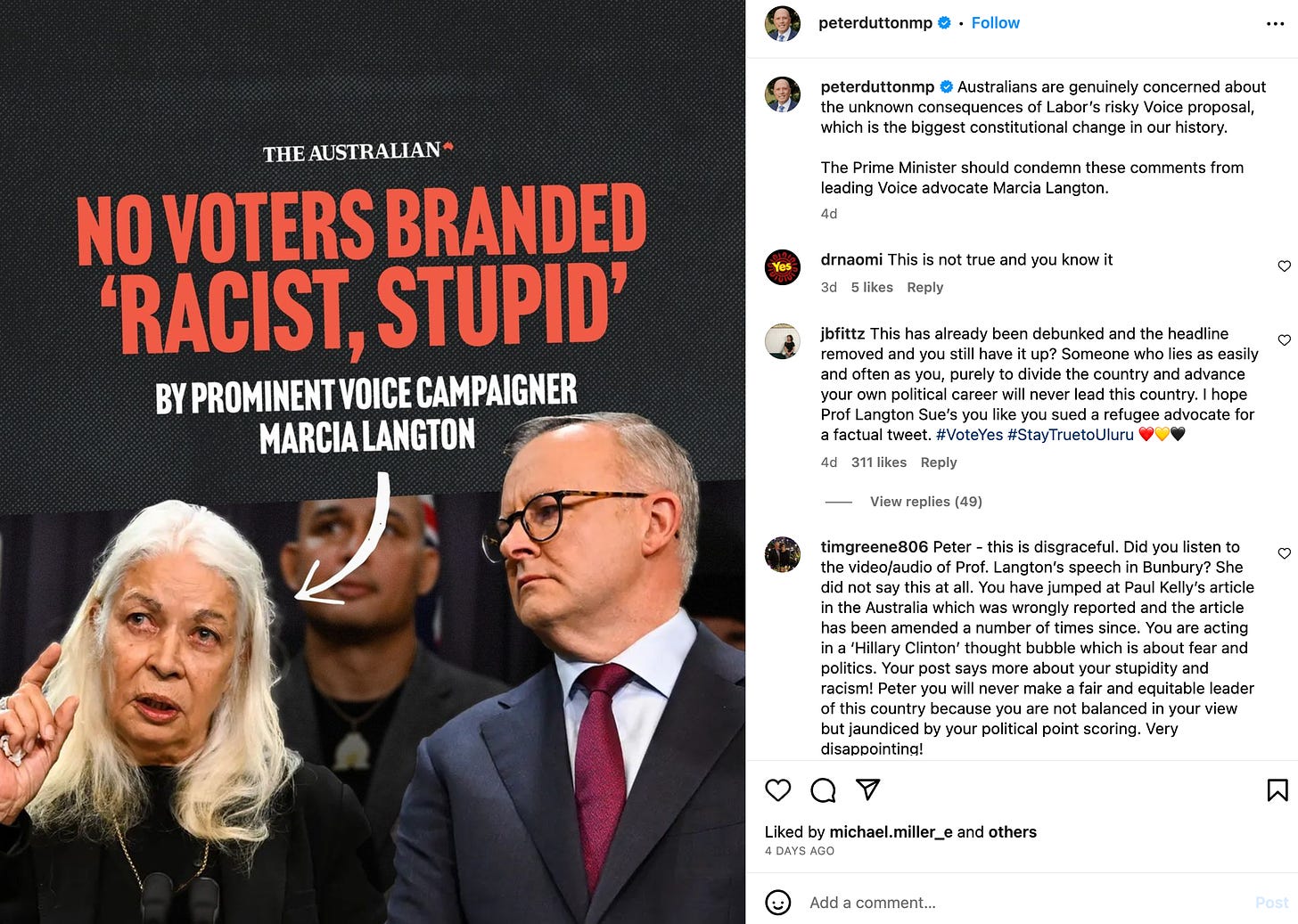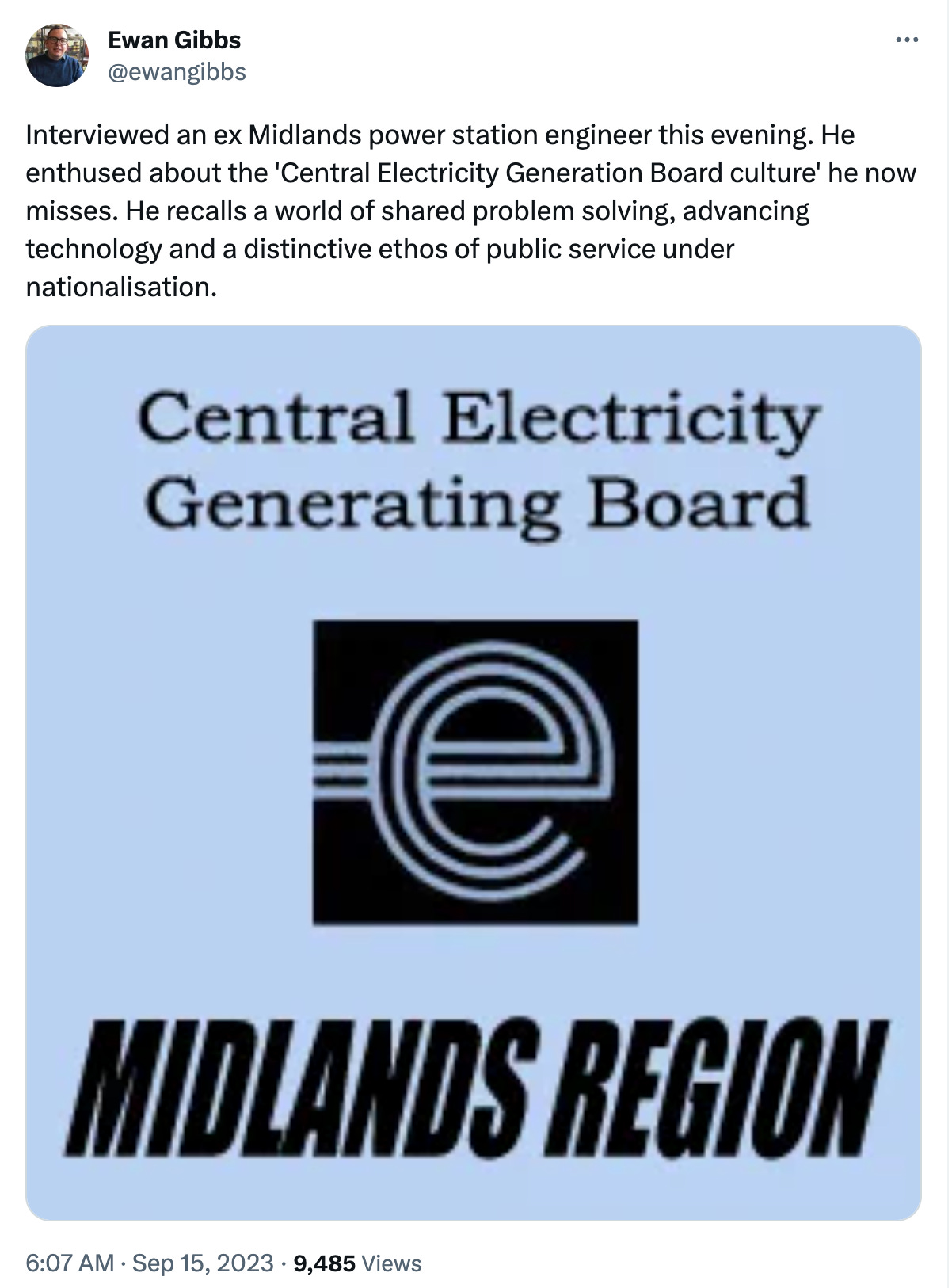
Towards the end of the Morrison government’s term in office I would often get distressed at media coverage — social and mainstream — of the prime minister’s latest antics. The sheer level of manipulation and misinformation we were being force fed, either directly by the government itself or via its mouthpieces in the media, sent me into something like a panic.
I don’t think I was alone.
After last week, I am having similar feelings about the Voice campaign, and I’ve been thinking about what’s going on. The willingness of journalists and politicians to lie to our faces, confident they will never be held to account — and then the powerlessness we can feel as this happens day after day — is the sort of thing that destroys a democracy. That’s one thing. But the problem goes beyond mere lying.
There is something wickedly wrong with the way our politics is mediated, the way in which it forces us — or guides us — to particular forms of engagement and understanding that have us living in a world of perpetual uncertainty and misdirection.
It has become standard to blame a lot of this on the algorithms that are tweaked for conflict and that ultimately decide what news and what responses to it are brought to our attention — our attention, not our rationality, being the thing that is being provoked and harvested — and it is true, this is a huge problem.
But conflict, misdirection, misinformation, various forms of unaddressed bias, and the prioritising on the insider view over that of the audience existed long before newsfeeds were shaped by algorithms. This way of mediating politics is so normalised that it is taught, and generations of young journalists learn how to do it as part of an enculturation process that is incredibly powerful.
The underlying cause is structural.
The political media is situated in a matrix of public interest journalism and private profit that cannot be reconciled. This creates perverse incentives all along the media-politics continuum and it is hardly a wonder that the product that is popped out at the end of it — the news we all consume — is a strange brew of truth, lies, substance and ephemera which we simply have no way of decoding consistently and satisfactorily.
When this process is heightened — as it is around an election, or at the hands of particularly egregious manipulator like Scott Morrison, or during a campaign that forces a complex question of history, politics, truth and reconciliation into a yes or no vote — people feel particularly overwhelmed and they either avoid, disengage or lash out.
Again, it isn’t just that media and politicians lie. It is that they subject us to a constant simulation of reality in which it is hard to locate ourselves and that leaves us feeling helpless. This helplessness is not just generated by politics and the media. It is a feature of an extractive system that ceaselessly operates in the interests of an economy not human society.
System is stacked against us
Most of the systems within which we must make a living, develop our relationships, try and live a life that rises above the level of being a mere cog that helps keep that machine turning for its own sake — all these systems and groups of powerful people — are so stacked against us, indifferent to us, it is no wonder that we wilt.
We know people are under stress. We know they avoid news. That they disengage from the life of the nation and seek psychic protection in everything from family to work to conspiracy theories, anything that makes them feel in control, at least of themselves. Anything that provides some padding against all the shit that is hurled at them, whether it be at the supermarket, at the bank, at work, or on television.
This is not democracy. This is a form of slavery. And none of it is an accident. It is a feature of nearly every system we are forced to operate within. We were once, according to Neil Postman — or Aldous Huxley — distracting ourselves to death. Now it is more like we are suffocating trying to keep our heads in a space above the avalanche of unreality crashing down upon us. Is it any wonder we retreat to our caves.
This isn’t about differences of opinion, either. Democracy, politics in general, can be a contact sport, and I don’t have a problem with that. The contest of ideas and all that. And I think I have shown over the years that I am happy to criticise those in power and that, conversely, I am willing to accept criticism in return, and I don’t complain about it.
I couldn’t give a damn either, that different people have different political views, that they try to solve the problems and manage the risks of complex societies in different ways. Conservative, liberal, socialist, whatever. That isn’t the problem.
Nor is it about civility. Sure, let’s be civil, but people in secure positions and with easy access to multiple media platforms in which to perform their own civility make too much of the idea of civility — the lack of it — as a cause of all our problems, when in fact that lack of civility is an effect, not a cause. A reaction.
Telling people to be civil is part of the problem, in fact. Telling people to be more civil without addressing the root causes of incivility is nothing more than a misdirection.
When someone says, as Jacinta Nampijinpa Price did this week, that “there is no ongoing negative impacts of colonisation”, damage is not just done to truth, to history, to any notion of a shared sense of self based upon provable facts. Whenever anyone makes a ridiculous claim like this, freighted with ill-intent and the desire to shock or even hurt, what is really damaged is the tenderness that allows us to find a shared space where different views can coexist and perhaps resolve.
Labor submits us to a similar sort of spiritual damage when it says out of one side of its mouth that it wants to do something serious about climate change while out of the other side it continues to approve coalmines. The positions cannot be reconciled and in expecting us to simply accept this disconnect in the name of some political goal is to smash the tenderness and reasonableness we need to be a functioning society.
Or take what happened to Professor Marcia Langton the other day. She said the No campaign is using racism and stupidity to further its ends, a bland statement of the obvious. This is reported as her saying all No voters are racist and stupid. Opposition Leader Peter Dutton links to such stories and refuses to remove them from his Insta feed.
The lie travels around the world while truth is trying to put on its shoes and socks, in the usual way, and in exactly the way The Australian was exploiting.
But then, even Guardian Australia reports that Langton “denies” criticising No voters. What?
Framing it as a denial makes it sound like there’s a legitimate debate. The point is, she didn’t say it, and that’s what should be reported. Framing it is as denial damages the tender space in which real discussion can take place by sneakily turning a fact — verifiable with various videos of the comments — into a matter of opinion.
This is what I mean when I say it isn’t just about outright lies: it is about forcing us to live in a world of misdirection and misinformation. Is it any wonder we get cross — beyond cross — at each other? That there is hateful, unproductive conflict?
The intellectual earth on which we all walk and where we might get to the end of an argument in compromise, or at least in the civilised restraint of agreeing to disagree, is being salted by the very people who should be nurturing it. In some ways, what the Guardian did is worse than what The Australian did.
Existential danger looms
All of this, all of these examples, are ordinary daily occurrences, and in that ordinariness the existential danger looms. They are all unexceptionable instances of something we either don’t consciously notice or, when we do, they are the sort of thing that many people — many journalists — shrug off and dismiss as no big deal.
How this blasé disregard for nurturing a space in which truth can function has developed is beyond the scope of this newsletter, but it has its roots in the material conditions of the world in which in live.
The neoliberal turn of the late ’70s and early ’80s — under governments of both major parties — reset national priorities in such a way that undermined the ties that bind us.
The major parties enacted policies that not only changed the culture to one of competitive individualism; those same policies have concentrated wealth to an obscene degree while undermining social services, leaving too many of us vulnerable. The project of managing risk inherent in living in large complex societies — a central role for which societies form in the first place — has been dumped on individuals rather than kept where it should be, as a collective problem to be solved collectively.
You end up with views like this:
The worldwide reaction caused by this casual call for more “hurt” for ordinary workers is indicative of just how on edge most of us are, and how out of touch and deluded people like Tim Gurner are. I mean, he is hardly the first one to express such views — they have been a staple of capitalism since forever. But the reaction he got suggests we are ready — more than ready — for… something else.
We know what needs to be done, but few in power have the inclination to make a difference. Much of the anger directed at the Albanese government from within its own ranks is a heartsick reaction to the fact that it is not providing leadership, that it has sacrificed power in the present for longevity on the never- never.
And the reason Labor is struggling so much in this regard is because of exactly what I have been talking about: the damage that has already been done to the tender spot in which disagreement can voiced. Labor pulls its punches because it knows the world of pain that awaits it if it steps outside the invisible but robust guardrails of the status quo. Until it becomes the status quo.
The creatures outside looked from pig to man, and from man to pig, and from pig to man again; but already it was impossible to say which was which.
George Orwell, Animal Farm (or was it Eileen Blair?)
If it is too scared, or beaten down, to act, imagine how the average person feels. And yet, that is where our best chance of change lies, in the unmediated discussion and interaction between ordinary people.
In a recent piece in TNR, Ana Marie Cox argued that Americans are not just polarised politically, they are suffering from what she calls collective trauma, and that it affects all aspects of life. “What if,” she asked, “the polarisation, paranoia, conspiracism, and hopelessness that bog us down have a more holistic origin than structural malfunctions or individual malfeasance?”
She quoted researcher Kai Erikson who has worked with communities after massive floods and who describes collective trauma as “a blow to the basic tissues of social life that damages the bonds attaching people together and impairs the prevailing sense of communality”.
Collective trauma happens in slow motion, A form of shock all the same … ‘I’ continue to exist, though damaged and maybe even permanently changed. ‘You’ continue to exist, though distant and hard to relate to. But ‘we’ no longer exist as a connected pair or as linked cells in a larger communal body.
I’m not sure of the efficacy of the notion of collective trauma, but I think it is important to understand the notion that “the basic tissues of social life” are being chewed through and leaving us all bereft. That’s what is happening with the mediation of politics I am describing.
Researcher Alex Fein’s beautiful words about the people she talks to in her qualitative interviews are a nice reminder of how we might keep that tender space for disagreement healthy:
At Redbridge, alongside our quantitative work, we also do a lot of qualitative research. Most nights, we’re speaking to Australians from across the country, listening to their stories. As we learn about what’s important to them, I continue to marvel at their insights, the depth of their thinking, and their generosity with the information they share.
Even those who have fallen down the conspiracy theory ‘rabbit hole’ confound expectations. They might have bought into various culture war tropes peddled by those desperate to distract from their own failures and abuses, but that does not mean that these people are incapable of compassion or reason.
These folks have taught me how expressions of vulnerability can seem dangerous to them after a lifetime of being brutalised by systems hostile to their interests. And they’ve shown me how quickly they can shift away from grievance against the marginalised, reorienting towards advocacy for progressive policies that will strengthen and protect all Australians … when they feel sufficiently safe to entertain such thinking.
We should take a lot of heart from this, just as we should from the success of the community independents whose close engagements with their electorates via kitchen table conversations and other events where people are listened to and heard shows us that positive change is possible.
Let me wrap this up by bringing us back to the referendum. A No vote in the referendum will damage that tender spot of disagreement on which civilisation depends, not because the vote is No, but because of the way in which the No campaign has gone about assembling its majority. Racism is a factor, but we are kidding ourselves if we think that is all it is. From Dutton down, the No campaign has sought to sway us to vote No by incinerating the space in which we might have reasonable discussion, in which even racism itself might be named and addressed.
Dutton sees a No vote as his ticket back to, not the political mainstream, but to a position in which he can exercise the power of minority disaffection, and as multiple people have pointed out, he is taking lessons from likeminded extremists in the United States who have already left that nation in pieces.
We shouldn’t be surprised that they relish this disruption. Extremism is, well, extreme. It can’t operate in normalcy and calm. By definition, it requires chaos. Inevitably, they will take every opportunity to generate it.
Again, this isn’t about disagreement per se. I am not arguing we all need to agree on everything and sing “Kumbaya” holding hands around the campfire. Conflict and disagreement are inevitable part of the life of any community. The problem is when we move beyond legitimate disagreement and enact tactics that despoil that fragile space in which disagreement can exist but community can survive.
This is an edited extract from Tim Dunlop’s The Future of Everything newsletter. You can read the full version here.











